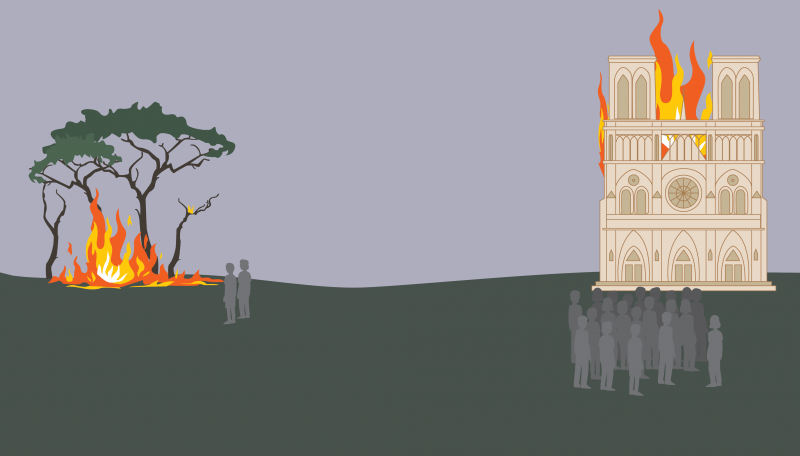When the Notre-Dame de Paris Cathedral burned, I was heartbroken – to see walls filled with history, culture, and years of human nuance being devoured by red flames was a sight to make the eyes burn.
The world was in an uproar, pictures of the beautiful church were everywhere, hashtags on social media were immediately trending. The media talked of nothing else.
Now, over 7,200 square miles of the Amazon have been burning since July. As a result, 131 Indigenous communities are turning into ash, and 3 million different species of plants and animals are suffering. It took the world three weeks to pay attention. It took the media three weeks to talk about it.
But still, leaders from the G-7 Summit offered up to $20 million US towards aid for the Amazon. And yet, the offer was refused by Brazil’s president, Jair Bolsonaro, because of a feud with the French president and summit host, Emmanuel Macron. Bolsonaro insisted that in order for there to be ‘talks,’ Macron should apologize. I would call this disturbed priorities from the leader of a country in a crisis.
My questions are directed towards the journalists. I understand that the Notre-Dame was caught on video and happened in one of the most populated areas in the world. But the Amazon is called the lungs of this planet. Why did it take three weeks?
The rainforest is the world’s biggest terrestrial carbon sinker and is now at risk of becoming dry land. I can’t help but feel that had the world known earlier, we could’ve acted earlier – maybe even prevented this.
“Scientists say the Amazon is approaching a tipping point, after which it will irreversibly degrade into a dry savannah,” journalist Jonathan Watts wrote for the Guardian. “At a time when the world needs billions more trees to absorb carbon and stabilise the climate, the planet is losing its biggest rainforest.”
Carole Pires wrote in the The New Yorker that Bolsonaro said more land in the Amazon should be used for farming, mining, and logging. Much like Trump, Bolsonaro is known for caring little about the environment. His campaign was fueled with racism, discrimination, and the incessant need to commercialize the entire country. His priorities have always been towards the green – just not the right one.
In what was the most environmentally ignorant act I’ve ever heard, Brazil’s president encouraged deforestation. Brought to us by Bolsonaro, Aug. 10 became Fire Day – a day when loggers intentionally set fire to clear the land for agriculture. According to Pires, Brazilian space satellites caught surges of wildfire soon after, and three weeks later a smokey apocalypse filled the skies of Sao Paulo – thousands of miles to the south. However, on Aug. 29, Bolsonaro issued a fire ban – for 60 days.
The problem didn’t start with the fire, and it will not end in 60 days. The problem is the fundamental misplacement of our leaders’ priorities. It’s a deep lack of ethical and moral values. It’s that we are not claiming responsibility, because it is ours. Was it not the majority of us who elected them?
The Amazon burning is a symbol that represents the casualties of greed. Burning rainforests, the loss of indigenous homes, climate change… All of these world problems have one dominant factor: prioritizing businesses and material gain at the expense of our Earth’s well-being.
Graphic by Victoria Blair
